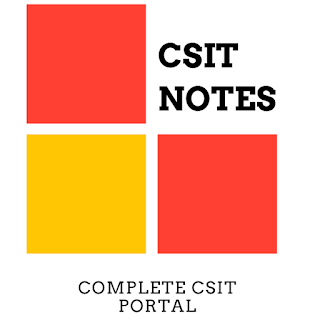BSc. CSIT - Tribhuvan University (TU) | What is csit | Why csit | What after csit
What is CSIT?
CSIT stands for Computer Science Information Technology.
Actually known as BSc. CSIT and was started as a 4-year course in 2011. There are
more than 60 colleges which offer CSIT course all around Nepal. The B.Sc. CSIT
program provides the students with sufficient theoretical and practical
knowledge that will allow students to participate effectively in solving the IT
industry's complex problem. Compared to the traditional computing environment CSIT course
offers new challenges. In addition to traditional lectures, BSc CSIT curriculum
requires a great deal of practical and project research. The curriculum
explores the basic concepts of both computer science and information technology
and demonstrates how to apply these principles to problems in the real world.
The training builds the skills that are important for computer and IT
professionals alike.
Why study csit?
CSIT is a perfect alternative to Engineering in Computer Science. This course
is equivalent to BE in computer. CSIT has a revised and practical oriented
curriculum that allows student to select their field of interest.
Which is better csit or bit?
CSIT and BIT are almost the same courses provided by Tribhuvan University (TU). Students
enrolled in Tribhuvan University's four-year CSIT and BIT
program are expected to take basic and core
courses in Information Technology, Mathematics, Statistics, Management ,
Economics, Sociology, Psychology, Research Methodology and Technical Writing,
as well as some elective courses. The only difference is credit hours. CSIT is
of 126 credit hours while BIT is of 120 credit hours. Students from management
and humanities or law can also join BIT. But you must have science as a major in
high school or +2 for joining CSIT.
What after bsc csit?
There are many opportunities for technical students these days. You can join
MSc. CSIT offered by TU or you can choose any of following career as your
interest. You can look for a job immediately after completion of the course. Many
choose MBA and utilize their knowledge and grow their own tech business. The startup is another inspiring way for enthusiasts and entrepreneurs.
Is csit hard?
CSIT is not a hard and difficult course to study. Unlike Engineering you can
have more time to utilize the knowledge practically. You can easily complete
this course working as a part-time job holder in related field which will be a
plus point to your portfolio and experience.
Job for csit
Jobs are competitive in IT sectors. Practical knowledge is really important. If
you have enough skills to the related field you can acquire the following job :
-
Computer and Information Systems Managers
- Computer-Control Programmers and Operators
- Computer programmer
- Computer Scientists
- Computer Support Specialists
- Computer Systems Analysts
- Database Administrators
- Desktop Publishers
- IT Officer
- Software Developers
- Web Administrator
- Web Designers
Salary for csit
Salary depends on kind of job and company. You can make money according to
your skill, interest, and dedication towards the job. Software developers earn an average of Rs.50000 to Rs.55000 per month. Web developers and designers in
Nepal earn an average of Rs.20000 to Rs. 45000 per month. However, there are many
csit passed out who earn more than average.
Colleges for csit
There are more than
60 colleges that
offer
csit course. Click here to find all colleges of Nepal that provides csit
course.

















